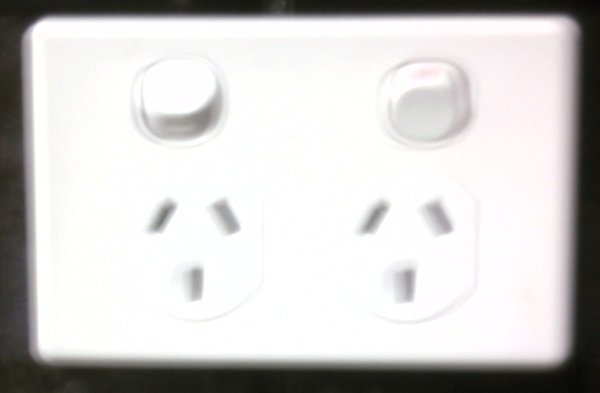Dear John (not your real name; you know who you are),
Subject to our conversation about the uselessness of government regulation and your assertion that all government regulation is bad, you set me the task of finding "just one area" where government regulation is good.
It took me longer to take the photograph, let alone to write this piece, than it did for me to come up with the example.
This should be an area which is close to your heart because it's also so very close to your wallet. Here is a picture.
This is a power point.
Wow.
Just wow.
Wow wow wow wow.
Wowie wowie wowie wow.
In 1937 the standard C112 plug/socket system was codified and in 1938 it was adpoted as a formal standard across Australia. This standard was superseded by AS 3112 in 1990 and formally adopted as AS/NZS 3112; currently AS/NZS 3112:2011.
Before 1937, plug and socket manufacturers were basically free to do as they chose but a series of gentlemen's agreements between plug/socket manufacturers and the State Electricity Commission of Victoria, solidified this as a working and proper thing.
It should be obvious to all and sundry that a standard electrical plug is good, fit and proper for everyone involved from plug/socket manufacturers, to electricity delivers, to appliance manufacturers, to consumers. Laws exist for the regulation, standardisation and protection of society and for something like electricity delivery, such a thing actually helps to protect people and stop buildings from burning to the ground.
You'd think that something as forgettable as a power point and plug standard would be simple to regulate but the document from Standards Australia and Standards New Zealand is 69 pages long¹.
Then there's the question of electricity delivery itself. Unbeknownst to most people, Australia's voltage is actually not 240V but a nominal 230V which was brought into line with the International Electrotechnical Commission's worldwide harminsation program, starting in 1981.
A 230V power supply can be delivered with voltages from a –6% to +10% variation on that standard; which means that this can be anything from 216.2V to 253V.
The thing is though that almost nobody in the real world, honestly knows or cares about the standard. Electricity is perfectly fungible; not only do consumers not care who generates their electric power, most of the time they're not even aware whose actually responsible for delivering it.
All they care about is that when they plug in their stuff into a wall, they get something that approximates 230 boring volts, at about 10 amperes and at a gloriously monotomous 50±5 cycles a second. Most of the time they don't even care about that; all they want is to have stuff work when they plug stuff in the wall.
Government regulations aren't inherently bad and to assert so is a lie. I mean you are free to jam forks into the wall if you so desire but the outcome might not be pleasant. On the upside, at least you won't live long to regret it.
People don't complain much either if they have to comply with other government regulations like road rules for the most part. There are lines painted on the road and people are safer driving a two tonne vehicle at 60km/h down the street than they are operating a fork. Above the age of 45 Coronary heart disease and other Cerebrovascular diseases are likely to kill people and below that Suicide is a greater cause of death than Land transport accidents².
This doesn't change the fact that the death rate for an individual over the course of their lifetime is pretty close too 100%.
People only really complain about government regulations when they impose direct costs or delays on someone, like having to pay taxes, or waiting for building approvals. The vast majority of government regulations go by totally unnoticed by people; yet they help to explain why their dinner was safe to eat, why they mostly got to and from work in as boring a manner as possible and why their workplace and house didn't spontaneously burst into flames.
Wowie wowie wowie wow. People often like to say that they'd like to use a machete to cut through red tape but the administration of boring regulation really does save the nation and some red tape holds the nation together. Think about that when you're microwaving your pizza pocket.
Pro lege,
Rollo
¹http://shop.standards.co.nz/catalog/3112:2011(AS%7CNZS)/scope?
²http://www.aihw.gov.au/deaths/leading-causes-of-death/


No comments:
Post a Comment